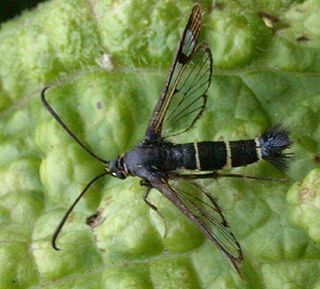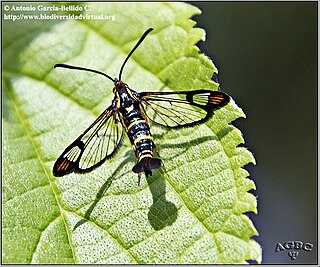
The Sesiidae or clearwing moths are a diurnal moth family in the order Lepidoptera known for their Batesian mimicry in both appearance and behaviour of various Hymenoptera.

Synanthedon culiciformis, known as the large red-belted clearwing, is a moth of the family Sesiidae. It is found in the Palearctic and Nearctic realms.

Synanthedon tipuliformis, known as the currant clearwing, is a moth of the family Sesiidae. It is endemic to the Palearctic realm, but is an invasive species in the Nearctic realm and the Australasian realm.
Synanthedon cupreifascia is a moth of the family Sesiidae. It is known only from locations near Mackay in Queensland.

Synanthedon is a genus of moths in the family Sesiidae.

Synanthedon andrenaeformis, the orange-tailed clearwing, is a moth of the family Sesiidae. It is known from most of Europe. It is also present in the Near East.

Synanthedon rileyana, the horsenettle borer or Riley's clearwing moth, is a moth of the family Sesiidae. It is found in the United States, including Arkansas, Arizona, Missouri, Oklahoma, North Carolina and Pennsylvania.

Synanthedon formicaeformis, the red-tipped clearwing, is a moth of the family Sesiidae and can be found in all of Europe, the eastern Palearctic realm, and the Near East. The larvae sometimes form pear-shaped galls on willows. It was first described by Eugenius Johann Christoph Esper in 1783.

Synanthedon stomoxiformis is a moth of the family Sesiidae. It is found in most of Europe and the Middle East.

Synanthedon cephiformis is a moth of the family Sesiidae. It is found in Central Europe and Eastern Europe.
Synanthedon cruciati is a moth of the family Sesiidae that is endemic to southern Spain.

Synanthedon codeti is a moth of the family Sesiidae. It is found in France, Spain, Portugal and on Sardinia. It is also found in North Africa, from Morocco to Algeria and Tunisia.

Synanthedon conopiformis, Dale's oak clearwing, is a moth of the family Sesiidae. It is found in almost all of Europe, except the north.
Synanthedon flaviventris, the sallow clearwing, is a moth of the family Sesiidae. The larvae form pear-shaped galls on sallows.
Synanthedon martjanovi is a moth of the family Sesiidae. It is found in Russia and Japan.
Synanthedon mesiaeformis is a moth of the family Sesiidae. It is found in France, Spain, Lithuania, Poland, the Czech Republic, most of the Balkan Peninsula, Finland, Russia and Asia Minor. The species prefers solitary trees on meadows, in parks and along streams.

Synanthedon scoliaeformis, the Welsh clearwing, is a moth of the family Sesiidae. It is found from almost all of Europe, east through Russia to Japan.

Synanthedon soffneri is a moth of the family Sesiidae. It is found in France, Germany, Switzerland, Austria, Poland, the Czech Republic, Slovakia, Slovenia, Finland and Russia.

Synanthedon spuleri is a moth of the family Sesiidae. It is found from France to Turkey and Georgia. In the south, it is found in southern and eastern Europe. In the north, the range extends to the line Paris-southern Germany.












